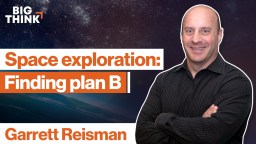Hard Science
All Stories
Why did the dinosaurs go extinct? Because they didn’t have a space program.
▸
4 min
—
with
Dr. Kate Biberdorf explains why boiling water makes it safer and how water molecules are unusual and cool.
▸
3 min
—
with
It’s likely the most complete skeleton that’s ever been discovered of the strange Gondwanatheria mammal group, which roamed the ancient supercontinent of Gondwana alongside dinosaurs.
The Space Force will soon launch its X-37B spacecraft on a classified mission.
This article has been retracted.
Being stuck at home is not as intense as being away from Earth, but there are ways to cope in either scenario.
▸
5 min
—
with
Astronomers release new data to challenge claims about the mysterious Planet Nine.
Gravitational wave researchers observe black holes of different sizes colliding for the first time.
▸
with
Olive oil leads to the discovery of a law that applies to atoms, superconductors, and even high energy physics.
New research proposes possible origins of the interstellar object ‘Oumuamua.
Groundbreaking new research suggests gamma-ray bursts are caused by a star’s collapsing magnetic field.
A binary white dwarf in a tight, super-fast rotation looks to be pumping out gravitational waves.
Need a distraction during these stay-at-home times? Look up tonight to see the first supermoon of spring.
A team of scientists created a new type of robot inspired by an octopus, and it could be a major breakthrough in the field.
The space agency is ready to establish a base camp by 2024.
Astronaut Garrett Reisman talks NASA, SpaceX, and where we’re headed next.
▸
4 min
—
with
New study of gamma rays and gravitational lensing points to the possible presence of dark matter.
Astronomers find these five chapters to be a handy way of conceiving the universe’s incredibly long lifespan.
A NASA-sponsored competition asks participants to improve the design of a bucket drum for moon excavation.
Using permanent magnets may help to make nuclear fusion reactors simpler and more affordable.
Through experiencing time in a nonlinear way, can artificial intelligence provide us more perspective?
▸
3 min
—
with
The ESO finds another exoplanet that’s definitely not a place for us to go.
A new study rocks prevailing theories on antimatter in the early Universe.
With lizard-like eyes and sharp teeth, this strange creature was likely smaller than your thumb.
The Hollywood blockbuster may have been right, if only 3.2 billion years off the mark.
Here’s a look at the space agency’s astronaut candidate requirements.
A new batch of papers reveals some of Mars’ subterranean secrets.
A volcano in California is a hot spot for conspiracy theorists.
MIT engineers devise a decision map to identify the best mission type to deflect an incoming asteroid.
Physicist Frank Wilczek proposes new methods of searching for extraterrestrial life.





























